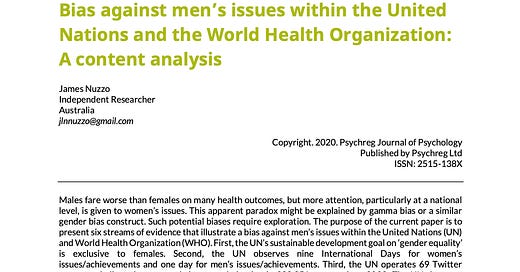Bias Against Men's Issues Within the United Nations and the World Health Organization: A Content Analysis
Dr. Nuzzo's Research
Full-text available here.
Psychreg Journal of Psychology
Abstract: Males fare worse than females on many health outcomes, but more attention, particularly at a national level, is given to women’s issues. This apparent paradox might be explained by gamma bias or a similar gender bias construct. Such potential biases require exploration. The purpose of the current paper is to present six streams of evidence that illustrate a bias against men’s issues within the United Nations (UN) and World Health Organization (WHO). First, the UN’s sustainable development goal on ‘gender equality’ is exclusive to females. Second, the UN observes nine International Days for women’s issues/achievements and one day for men’s issues/achievements. Third, the UN operates 69 Twitter accounts dedicated to women’s issues, culminating in 328,251 tweets since 2008. The UN does not operate a Twitter account for men’s issues. Fourth, female words (e.g., ‘women’) appear more frequently than male words (e.g., ‘men’) in documents archived in the UN and WHO databases, indicating more attention to women’s issues. Fifth, in WHO reports where similar use of male and female words might be expected (e.g., gender and health reports), female words appear more frequently. Sixth, more female than male words appear in the Bulletin of the World Health Organization, with articles on women’s health more frequently non-original research (e.g., editorials). Overall, because the UN and WHO are the causal agents directly responsible for the outcomes assessed, the findings reveal a bias against men’s issues within these organisations. The findings support the construct of gamma bias. Ways to reduce this bias are discussed.
SUPPORT THE NUZZO LETTER
If you appreciated this content, please consider supporting The Nuzzo Letter with a one-time or recurring donation. Your support is greatly appreciated. It helps me to continue to work on independent research projects and fight for my evidence-based discourse. To donate, click the DonorBox logo. In two simple steps, you can donate using ApplePay, PayPal, or another service. Thank you!





